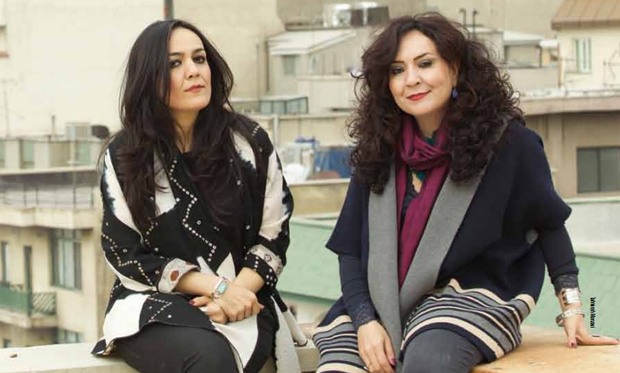27 May 2015 | Events, mobile
Panel discussion including acclaimed singers and a past Index on Censorship Freedom of Expression Award winner Mahsa and Marjan Vahdat alongside Natalia Koliada, co-founder of Belarus Free Theatre, and Lisa Peschel of the University of York who has recently rediscovered extensive archival material of performances, scripts and revues performed in the Nazi ghetto Terezinstadt. The event will be chaired by Julia Farrington of Index on Censorship.
The panel will be asked to explore from their personal and political perspective different aspects of freedom of expression in repressive regimes; the interface between artistic inspiration and life in repressive regimes, and the role of the media in terms of raising awareness of the increasing restrictions placed on artists to curb freedom of expression.
When: Saturday 6 June 2015, 5.00pm to 6.15pm
Where: National Centre for Early Music, Walmgate, YO1 9TL (map)
Tickets: Free admission. Booking required. Additional information: 01904 658338.
4 Mar 2011 | Iran, Middle East and North Africa
What would you do if the music you wanted to make were forbidden ? What if someone in power didn’t want it heard?
Would you be silent? Or would you play it louder ?
I first heard the voice of Mahsa Vahdat at the height of the people’s uprising in 2009. A friend sent me a video of her singing with Mighty Sam McClain. In it her voice was exquisite in its clarity. A year later, in September 2010, I had the opportunity to hear her perform live when Index invited Mahsa to come to from Tehran to sing at the launch of Smashed Hits 2.0 (buy here) –– an issue of the quarterly magazine devoted to the issue of censorship in music. My friend Richard, who plays the oud joined me for the concert and afterwards delighted me with the gift of one of her CDs, on sale that night. I decided to buy the other for my father who enjoyed good music more than anyone I knew. Mahsa and I met and I asked her to sign my CDs, knowing then that this was a special moment.
Mahsa’s voice brought my father profound peace and pleasure in the last days of his life, and I think about all the unsung voices that go unheard in my country — an extraordinary abuse by the Iranian regime. On Music Freedom Day (3 March), I asked Mahsa to share her feelings about being a singer in Iran.
“It is a deeply sad feeling for a woman when a ruling power takes something natural from her. Singing comes from your pure nature, so it’s like being banned from smiling or crying. It’s a fight with a truth, a God-given gift and it is sad to try to ban it. We’ve seen that nobody can fight the truth. Even if they ban it we see that women will not stop singing.
From another perspective, the female voice is part of our human heritage, to ban this voice is to damage our art and music. When a woman is banned from singing, naturally many composers will not compose for women, if they do, they give it to a man to sing because they want the work published. This has an effect on the spirit of their music.
This ban also has a more profound social effect, because as humans the voice of a woman is familiar to us and resonates from when we are in our mother’s body. Not hearing this voice later therefore, disturbs our emotional balance.
I think the main reason for banning the female voice boils down to fear of female power. They’re trying to eradicate the things that make a woman more powerful. It is very sad to think you could engage people in your country with your music but you’re banned. You could change them, you could motivate them, but when you can’t sing give a concert publically…the whole story is deeply sad.
I always consider that I’m living in my imaginary Iran and I’ve learned that my stage is not just the public stage, that every place can be my stage, in my home, in my friends’ homes, so banning me from singing in a public place has never stopped me nor diminished my motivation. I am ever hopeful about the future and I am certain that I will perform freely in my homeland.
I dedicate Silent Song [from the album Scent of Reunion] to this important day.”
Listen to Silent Song on Spotify
For more Information on Music Freedom Day http://musicfreedomday.org/
And FreeMuse – for freedom of musical expression http://www.freemuse.org/sw305.asp
20 Aug 2010 | Events
 Index on Censorship celebrates the launch of its new magazine on music and free expression with performances by the Iranian singer Mahsa Vahdat and oud player Khyam Allam at the Free Word Centre.
Index on Censorship celebrates the launch of its new magazine on music and free expression with performances by the Iranian singer Mahsa Vahdat and oud player Khyam Allam at the Free Word Centre.
Mahsa Vahdat is winner of the Freemuse Award 2010.
Khyam Allami is the first recipient of BBC Radio 3’s World Routes Academy scholarship and made his debut at Womad and the Proms this summer.
Index on Censorship invites you to join the festivities and tune into Smashed Hits 2.0 Live.
To reserve a place, call 020 7324 2570 or click here
6:30pm. 21 September 2010. Free Word Centre, London


 Index on Censorship celebrates the launch of its new magazine on music and free expression with performances by the Iranian singer Mahsa Vahdat and oud player Khyam Allam at the Free Word Centre.
Index on Censorship celebrates the launch of its new magazine on music and free expression with performances by the Iranian singer Mahsa Vahdat and oud player Khyam Allam at the Free Word Centre.